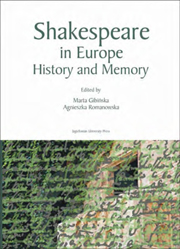Book contents
- Frontmatter
- Contents
- Preface
- Towards a European History of Henry V
- History and Histories
- The Bad Quarto Hamlet and the Polish Connection
- Cross-Histories, Straying Narratives: Anglo-Portuguese Imbrications and Shakespeare's History Plays
- The Art of War in Shakespeare and in European Renaissance Treatises
- The “Histories” of Henry VI
- Shakespeare's Imperfect Memory of History
- “Retail'd to All Posterity:” The Case of Richard III
- Halting Modernity: Richard III's Preposterous Body and History
- History and Memory: Criticism and Reception
- History, Memory, and Ideological Appropriation
- Theatre: The Act of Memory and History in the Making
- Index of Authors
Cross-Histories, Straying Narratives: Anglo-Portuguese Imbrications and Shakespeare's History Plays
from History and Histories
Published online by Cambridge University Press: 05 September 2014
- Frontmatter
- Contents
- Preface
- Towards a European History of Henry V
- History and Histories
- The Bad Quarto Hamlet and the Polish Connection
- Cross-Histories, Straying Narratives: Anglo-Portuguese Imbrications and Shakespeare's History Plays
- The Art of War in Shakespeare and in European Renaissance Treatises
- The “Histories” of Henry VI
- Shakespeare's Imperfect Memory of History
- “Retail'd to All Posterity:” The Case of Richard III
- Halting Modernity: Richard III's Preposterous Body and History
- History and Memory: Criticism and Reception
- History, Memory, and Ideological Appropriation
- Theatre: The Act of Memory and History in the Making
- Index of Authors
Summary
This paper is not a study of translations, and yet it derives its raison d'être from a circumstance highlighted by translation. Browsing through available Portuguese versions of Shakespeare's history plays makes it clear that, in their textual strategies as much as in the information provided by their critical apparatus, they hardly ever contribute to their readers' awareness of how closely involved English and Portuguese histories were in the period covered by Richard II, the Henry IV plays and Henry V. This extends to the options made by translators with regard (for example) to names, English aristocratic and dynastic names that have accepted versions in Portuguese owing to the shared elements of the two countries' histories in the period in question.
The most obvious case is Lencastre: this has come to be a fairly common family name in Portugal, and several streets and squares (even schools) are named after Dona Filipa de Lencastre; however, not many educated readers will be aware that it is a version of the English dynastic name Lancaster, brought into Portugal through the abovementioned entanglements. These date in fact from the year of 1367 (in the reign of Edward III) – the year when the future Richard II is born, also the first year of the reign of Fernando I of Portugal – when John of Gaunt, duke of Lancaster, who would grow increasingly influential at court towards the latter part of his father's reign, first proposed an alliance to the Portuguese king, to be furthered and confirmed by treaties signed in 1372–1373, 1380 and 1386. Gaunt would remain for years an active participant in Iberian affairs, for the furthering of his personal and dynastic ambitions, in addition to his direct or vicarious participation (much better-known to readers of Shakespeare) in English political and dynastic complications.
- Type
- Chapter
- Information
- Shakespeare in EuropeHistory and Memory, pp. 45 - 56Publisher: Jagiellonian University PressPrint publication year: 2008



